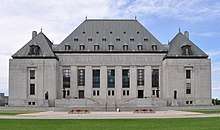Reference Re Residential Tenancies Act (Ontario)
Reference Re Residential Tenancies Act (Ontario), [1981] 1 S.C.R. 714 is a leading Supreme Court of Canada decision on the jurisdiction of superior courts provided by section 96 of the Constitution Act, 1867. The Court formulated a three-step test for determining whether an administrative body was encroaching upon the jurisdiction of the superior courts.
| Reference Re Residential Tenancies Act (Ontario) | |
|---|---|
 | |
| Hearing: November 25-26, 1980 Judgment: May 28, 1981 | |
| Full case name | Re Residential Tenancies Act, 1979, [1981] 1 S.C.R. 714 |
| Citations | {{{citations}}} |
| Court membership | |
| Chief Justice: Bora Laskin Puisne Justices: Ronald Martland, Roland Ritchie, Brian Dickson, Jean Beetz, Willard Estey, William McIntyre, Julien Chouinard, Antonio Lamer | |
| Reasons given | |
| Majority | Dickson J. (as he then was) |
Test formulated by Court
Justice Dickson, writing for the majority, suggested the test.
- Firstly, it must be determined "whether the power or jurisdiction conforms to the power or jurisdiction exercised by superior, district or county courts at the time of Confederation."[1]
- Secondly, the test asks "whether the function itself is different when viewed in that setting. In particular, can the function still be considered to be a 'judicial' function."[2]
- Thirdly, the test asks the court to "review the tribunal's function as a whole in order to appraise the impugned function in its entire institutional context."[3]
In this case, it was determined that Ontario's Residential Tenancies Act was not valid provincial legislation.
Subsequent case law
The test was later applied in Massey-Ferguson Industries v. Govt. of Sask., [1981] 2 S.C.R. 413, and eventually modified in Sobeys Stores v. Yeomans, [1989] 1 S.C.R. 238.
gollark: And regular potatOS.
gollark: I had some problems with PotatOS Tetrahedron.
gollark: I know! It barely functions and I have to do lots of work to keep it working when the BIOS changes, but it does.
gollark: PotatOS doesn't work in CraftOS-PC and I have no idea why.
gollark: That can be your next project.
Notes
- p. 734
- ibid.
- p. 735
This article is issued from Wikipedia. The text is licensed under Creative Commons - Attribution - Sharealike. Additional terms may apply for the media files.